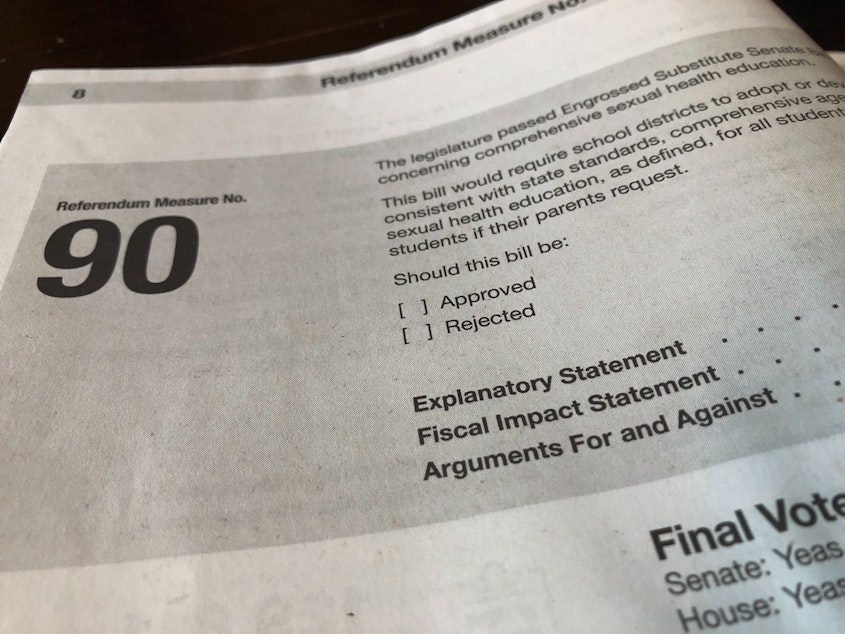How the sex education referendum made it to your ballot, and what it means

During this election, there's just one referendum on the ballot. It's asking voters whether to approve a law, already passed by the State Legislature, requiring schools to teach comprehensive sex education.
Associated Press education reporter Sally Ho joined KUOW to discuss Referendum 90.
The following comments are from Sally Ho's interview with KUOW’s Kim Malcolm
T
his is a wide-ranging proposal. It's a comprehensive sex education mandate in K-12 public schools. It would require all the state's 295 public school districts to teach age-appropriate sex ed concepts by grade level.
In kindergarten through third grade, that’s social emotional learning, which is managing your feelings, how to make friends. There's no sexuality taught in those younger grades.
What is taught in the older grades is what makes it one of the most progressive statewide sex ed mandates in the country, because it addresses relatively new concepts in the classroom — like affirmative consent, which was born from the Me Too movement — and also LGBTQ issues, and bystander training.
Sponsored
Sex ed elsewhere in the country has always been settled at the school district and state house level. What happened here is that in March, the Senate bill in Olympia requiring this was approved by Democrats without any Republican support.
Almost immediately, there was this backlash by aggrieved Republicans and religious conservatives who band together. They collectively just felt unheard, shut out, powerless. They began a signature-gathering petition, during a pandemic, to force the issue onto the ballot for a vote.
The campaign against this said that [Republicans are] not against sex ed, but that school districts should be able to teach sex ed as they wish, in a way that fits the community.
Even though school districts create and choose their own curriculum, they still have to cover the same concepts. Some of those concepts have been offensive to religious conservatives like the Catholic church, which says teaching affirmative consent goes against their religious beliefs on premarital sex.
There's also a viral cartoon depicting sex positions that's caused quite a frenzy since circulating online. The cartoon actually stems from a well-regarded parenting book called It's Perfectly Normal, which is on a list of resources suggested by the state Education Department that's in line with the sex education bill.
But the book is optional for parents, and not included in any of the student material that a school could even potentially offer. Still, the campaign against sex ed says this is akin to teaching sex positions to fourth graders, which would only be the case if a parent decides to share it with them.
Sponsored
[Supporters of this curriculum] have presented this bill as the answer to what they consider a public health crisis: That kids need this, at very young ages. That it's a good thing that very young kids are able to talk about sensitive topics with trusted adults at schools, so that they could potentially stop sexual abuse among young boys and girls who may not even understand what an inappropriate touch is.
The supporters of this bill also point to a higher rate of sexually transmitted infections correlated in areas where school districts don’t teach sex ed comprehensively, or at all.
I can't speculate about the outcome, but this is already proving to be a unique case of politics and policy. Rarely, if ever, does school curriculum get recalled by voters like this. It's just not done.
And referendums in general, historically, are a pretty tough sell. Meaning that any effort to overturn something is usually an uphill battle. But, the campaign against sex ed has already shown through its historic petitioning, during a pandemic no less, than it can make waves.
Sponsored
Politically, it will be a test of the recent influence of the state’s GOP forces as the minority party in this deeply liberal state. So, the answer is yes, I expect a very tight race.
Ballots are due on November 3.
Listen to the interview by clicking the play button above.





